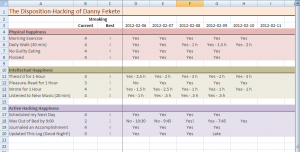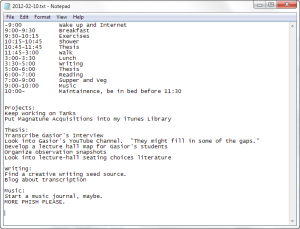Unwonted Productivity
(This post starts with lots of tedious, whining context. If you’d like to skip to the good stuff, please click here.)
Since fourth-year of my undergrad, my academic life has been a losing struggle for productivity. Procrastination no longer tested the edge of my due-dates, but the patience of my professors. By the first couple of years at OISE, I actually got fatalistic about it, and felt often as if I was watching my own self-destruction from a safe distance with idle, morbid fascination. Sometimes, I could muster misery; often I dallied with shame and self-loathing (publically, even, to the grief and probable boredom of friends and family). My rationalizations for the consistently missed deadlines, and the undeniable fact that my peers were marching past me academically and socially, were always based in some sort of reality but they became increasingly byzantine and hollow. I incorporated my sense of futility into my identity and wondered that I had ever respected myself. It’s likely that I was clinically depressed, but consistently, I didn’t face it.
My desperation to be done with my thesis eventually grew strong enough to break through my apathy, and I started actively working on strategies to get work done. Brian and I had some productivity dates around the time I was working at Indigo, the semi-successful engine of which was simulated peer pressure (since neither of us would ever have dreamed of chewing the other out for flakiness). Scheduling and proximity were a problem, though, and made these meetings inconsistent. When I moved up north after Gideon got his job in La Loche, the distance was an issue and meetings eventually stopped altogether. There’ve been less distractions up here, and I’d become marginally more productive than I was in Toronto, but progress remained agonizing.
Over the last five days, I have (tentatively, but optimistically) turned myself around. As with anything like this, consistency is more important than initial, favourable results, and therefore the bubbly remains on ice. But, I’m chronicling how it happened here so that
- If I lose my way, I can come back here and try to reboot;
- If it turns out that this changed my life, I’ve got a record of my personality on the cusp, when I was happy and hopeful, but before I got all arrogant and preachy;
- Maybe a variant of this approach can eventually be useful to someone else.
What I’m trying came out of a few places. First, Byron mentioned during New Year’s that he’d had a lot of luck with doing daily schedules—having something to tell him what he should be doing at any given time (including when he was allowed to not be doing anything in particular) helped motivate him to work on his programming project after work, instead of immediately vegging out. I had resisted this sort of technique in the past, figuring that while I tended to get lots done working to someone else’s timetable, I’d inevitably rationalize out of following one I’d imposed on myself (on grounds of arbitrariness and lack of consequences, etc.).
Next, I’d read a piece on Life Hacker about the motivational power of keeping track of streaks—basically, if you accomplish what you want to become a regular task a few times in a row, your knowledge of the fact accrues a kind of momentum: it becomes more and more of a shame to break the streak as it gets longer and longer, making counterproductive impulses less appealing. This is something I’d definitely noticed independently over the last year when I started eating carefully and (again, with Gid’s help) exercising regularly. The crucial thing, here, is to keep your streak constantly in mind—Life Hacker recommends a full-year calendar in an obvious place, marked off after each success so that your accomplishments will be repeatedly reinforced at a glance.
Consistency seems to promote habits and eventually dispositions. Byron said that his regular schedule-writing became less important as he replaced the habit of getting home and vegging with the habit of getting home, programming for an hour, and then vegging. This plugged neatly into Shawn Achor’s TED Talk, which Joel sent me five days ago: active habits could be intentionally engineered, as Byron demonstrated (and as I’ve been pleased to find, myself)—so too, argues Achor (with encouraging evidence), can mental habits, or dispositions. Something about all of this pushed me to build the following daily checklist immediately after watch the TED, but (crucially) also to see it as an experiment in self-modification, rather than an arbitrary, self-imposed strategy I could self-destruct by failing.
It started with this table:
I incorporated into the Disposition-Hacker elements I was most interested in from Achor’s concluding list (about 11:00 in the video), and then, for fun, added a few things I’ve regularly wished I was doing with my life but couldn’t do because I was procrastinating school work with stuff I didn’t even want to do (obsessive videogaming and mainlining episodes of 30 Rock, it turns out): reading for pleasure had become a wretched escapism, and I haven’t been patient enough to sit and just listen to music for years. These were habits I wanted to develop, and putting them in the list meant I’d need to schedule them, which meant, presumably, I’d get to do them without feeling guilty. And writing. Being good at writing, and writing enough to empty ink bottles, had been the core of my identity when I’d been at my very happiest—second- and third- year undergrad—but my desire to do it at all has been awfully low for a long time. My vocabulary has withered and my self-confidence is as doot with respect to what I produce when I do write (sporadic blog posts are, at least a little bit, a consequence of that). I miss the rush of obsessive poem-writing and the pride of sharing my creative stuff (foisting, even—who cares? It was awesome!). If I’m actively shaping my habits to reflect an ideal identity, I’ma fucking write, yeah.
(And, I figured, in case this actually works, I’ll chuck flossing in there too.)
Here’s a sample of my schedule, written without fancy, geegaw-festooned applications, in Wordpad and stored in my main Dropbox folder, at Byron’s recommendation.
When I lose myself in video games (at least lately), it starts with me thinking, “Well, I’m not doing anything right now. Of the things I could be doing, [game on the go] would be easy to do. And when I’m done doing that, it won’t be an option anymore, so then I’ll probably pick something more important and valuable to do. It’s three in the morning.” Always knowing what I wanted myself to be doing at any given time, and having the information at my fingertips, has been a very effective way of avoiding that mindset. When I recognized this, I started listing projects and ideas in the same document in case, faced with the vagueness of “writing” or “thesis,” I get the urge to mull over my options again while doing something more immediately comforting and appealing. (I copy the projects to each new schedule and then delete the entries I’ve accomplished, which helps me prime topics for Achor’s journaling recommendation.)
I’m tracking my streaks in the excel chart, and my “best streak” for each item to help motivate me if I lose a streak and get sad. Also, initially out of interest and increasingly out of compulsive data collection, I’ve been recording the amount of time I spend on each habit. At the moment, I’ve been doing much more than my allotted requirements for a number of them (this may also even benefit from the streak phenomenon—who knows?). Concordantly, I’ve decided that keeping rigidly to my schedule is less important than keeping to the daily goals: if I’m on a roll with my thesis, I won’t force myself to break for lunch (and, when I’m back in Toronto with social obligations, I can still reasonably hold myself to the minimum requirements of list).
Again, I’ll see how this goes. But, for now at least, it’s pretty great to be productive and happy.
Danny from 2016: This worked well for months, and I came back to the approach in one form or another a handful of times since then. I’ve replaced the spreadsheet with Loop for Android, which is one of now countless habit-tracking apps floating around, and my current situation makes scheduling a full day the way I’ve described above very difficult to maintain. I’m currently successful with a system of very, very few habits being tracked at a time, though I’ve fallen away from logging my daily accomplishments and gratitudes; re-reading that journal now as I try to recover my old Philomathy posts, it fires me with enthusiasm to start it up again.


